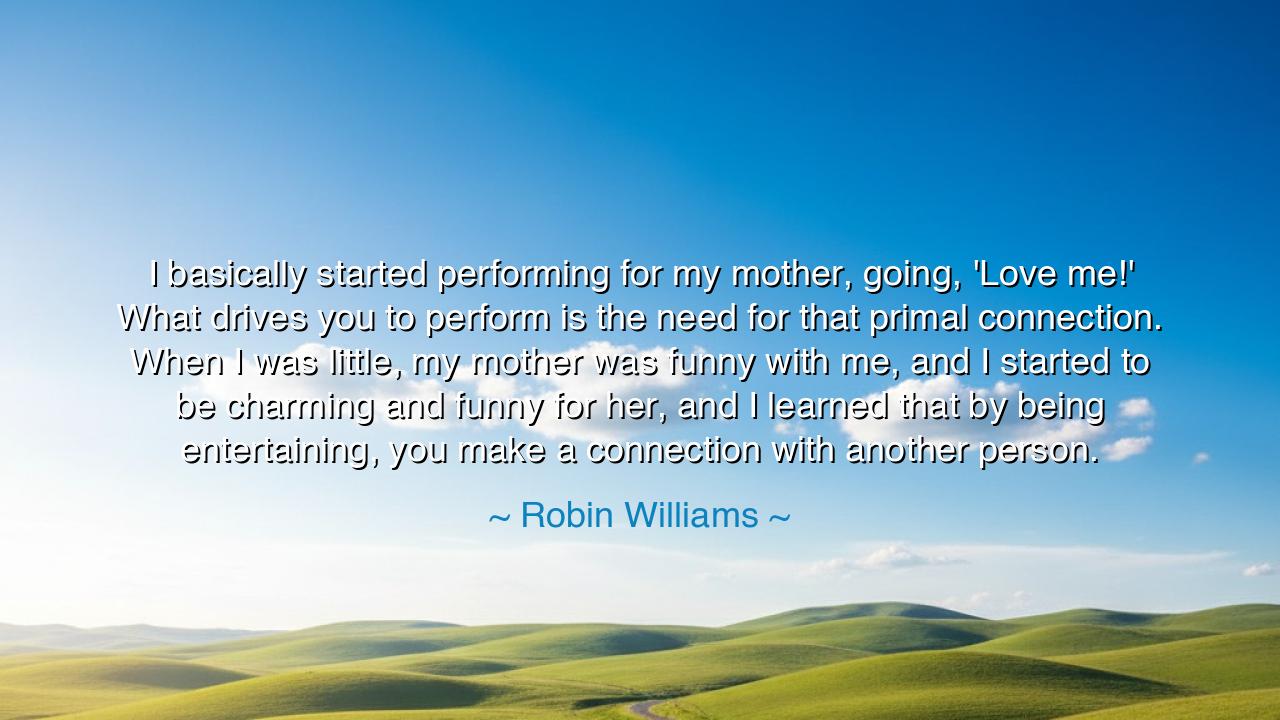
I basically started performing for my mother, going, 'Love me!'
I basically started performing for my mother, going, 'Love me!' What drives you to perform is the need for that primal connection. When I was little, my mother was funny with me, and I started to be charming and funny for her, and I learned that by being entertaining, you make a connection with another person.






In the words of Robin Williams, “I basically started performing for my mother, going, ‘Love me!’ What drives you to perform is the need for that primal connection. When I was little, my mother was funny with me, and I started to be charming and funny for her, and I learned that by being entertaining, you make a connection with another person.” Here, the great fool-saint of our age bares his heart — not behind the laughter, but beneath it. His words are not merely about performance or comedy, but about the ancient hunger of the soul for love and belonging. They remind us that behind every act of expression, every work of art, every song and story, there beats the yearning of a child looking into the eyes of the world and whispering, “Do you see me? Do you love me?”
To perform is not only to entertain; it is to reach across the distance that separates one heart from another. Robin’s confession echoes the oldest truth of humanity — that the need for connection is as essential as breath. Before there was theater, before the written word, there was the child seeking approval in a mother’s gaze. In that gaze, love was learned, and the art of communication was born. From such tender beginnings spring the great fires of creativity. The poets, the jesters, the prophets — all are driven by the same force: the longing to bridge the silence between souls.
The ancients knew this longing well. In the legend of Narcissus, a youth falls in love with his reflection, mistaking it for another. Though the tale warns of vanity, there lies beneath it a deeper meaning: the human being sees himself only through the eyes of others. Without reflection — without acknowledgment — the self begins to fade. Robin understood this, not as a cautionary tale but as a calling. Through humor, through performance, he offered his heart to others, saying, “If I can make you laugh, then I exist in your joy.” Thus, his art became both shield and offering, protection from loneliness and gift of communion.
And yet, there is both beauty and tragedy in such a life. For those who learn early that love must be earned through laughter often carry a hidden burden — the fear of silence. When the laughter fades, they stand alone, uncertain if the love remains. Robin’s words are heavy with that awareness. He knew that the stage is both sanctuary and mirror, that the applause which feeds the heart can also haunt it. His “primal connection” was sacred, but fragile. In this, he is not alone. Many great spirits — from Charlie Chaplin to Lucille Ball — carried within them a similar ache: the need to heal the world’s sorrow while quietly nursing their own.
But let us not see only the pain. Let us see also the divine wisdom hidden in his words. For what Robin teaches is that humor is love in motion. To be “entertaining,” as he says, is not to be shallow — it is to reach out with courage, to lift another’s heart with your own energy. The performer, in his truest form, becomes a vessel of empathy. He feels the emotions others cannot express and returns them transformed into laughter, a healing sound. Thus, the act of performing, born from a child’s plea for love, becomes a noble act of service — the giving of light in a darkened world.
Consider the tale of Democritus, the laughing philosopher of ancient Greece. He was said to wander the streets laughing not because he was mad, but because he saw the folly of humankind and loved it still. His laughter was compassion disguised as mirth, much like Robin’s. Both men saw that laughter, when born of empathy, unites rather than divides, heals rather than mocks. In every jest, there was a seed of mercy — a way of saying, “We are all foolish, and that is what makes us beautiful.”
So, my child, learn from Robin’s confession. If you feel the hunger to be seen, do not scorn it. It is not weakness; it is your soul’s desire to connect. But remember this: let your art, your humor, your kindness, not be a mask for pain but a bridge of sincerity. Let your desire to be loved grow into the desire to love others through your gifts. When you speak, when you create, when you make another smile — do it not for applause, but for connection. For in that connection, you will find not only love, but peace.
Practical teaching: Each day, offer something of yourself — a joke, a kind word, a story — to make another’s burden lighter. But after you give, return to silence and ask yourself, “Do I also love myself when no one is watching?” This balance is the key. Perform for others with joy, but nourish your own heart in quietude. Seek connection, not approval; love, not validation. Then your laughter will become truth, your art will become prayer, and your life — like Robin’s — will echo through eternity as both healing and light.






AAdministratorAdministrator
Welcome, honored guests. Please leave a comment, we will respond soon